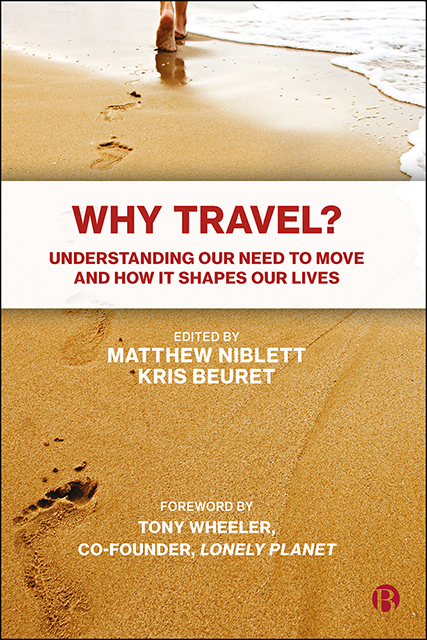Book contents
11 - Travel as Exploration: Science, the Unknown and Personal Discovery
Published online by Cambridge University Press: 21 April 2023
Summary
Introduction
Exploration is often understood as discovery: travelling to places, or acquiring knowledge, that is new to us. Historian Paul Fussell (1980) conceives exploration this way, distinguishing exploration from other kinds of travel by the way explorers seek out ‘the undiscovered’, moving ‘towards the formless and the unknown’. For Fussell, exploration is a heroic, athletic, paramilitary activity. He conjures up images of buccaneering explorers, travelling across seas and continents to reach distant lands: Christopher Columbus; Francis Drake; Scott of the Antarctic. Others conceive exploration more broadly. For example, historian William Goetzmann argues that exploration is ‘something more’ than adventure or discovery. He describes exploration as a kind of purposeful seeking, and argues it is the process of seeking that matters – for discoveries can be produced by accident (1966: xi).
This chapter considers human exploration, and what it can tell us about the motivations underlying human travel. The first part briefly describes the history of exploration, focusing on the European ‘Age of Discovery’. It asks why people explored, and explains the increasing role that science came to play, driven by the work of philosopher Francis Bacon. The second part looks at possibilities for explorative travel today. It argues grand journeys of discovery are still feasible, especially in the shape of undersea or space travel. Further, personal journeys of exploration are available to all of us – there are always more places to see, more world to understand.
A very brief history of human exploration
Humans have been exploring for a very long time. Over the course of our history as a species, we have settled on continents all over the planet (see Chapter 2 ‘Biological Perspectives on Travel’). Historian Felipe Fernández-Armesto argues that the chronicle of our species has two major stories to tell. The first is one of ‘divergence’. This occupies most of our pre-history, extending from the emergence of Homo sapiens around 300,000 years ago to the past few thousand years. During this period early human cultures formed, grew more disparate and dissimilar, migrating across continents. The second story is one of ‘convergence’. This occupies the most recent 10,000 years and tells how humankind has gradually reconnected, starting to come together globally (2006: 1–4). Both stories are tales of exploration, but this chapter will focus on the second.
Written records from antiquity provide insights into the purposes and experiences of early explorers.
- Type
- Chapter
- Information
- Why Travel?Understanding Our Need to Move and How It Shapes Our Lives, pp. 205 - 228Publisher: Bristol University PressPrint publication year: 2021



